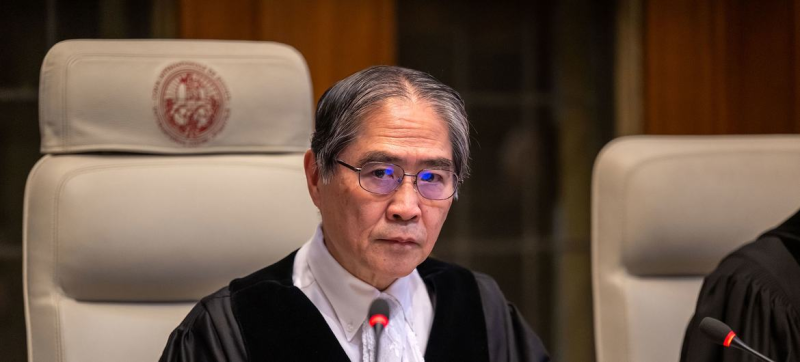- Sea of Mourners Gathers to Pay Tribute to Khaleda Zia |
- State mourning begins, state funeral for Khaleda Zia at 2 pm |
- Kamal Hossain: Khaleda Zia was ‘a patriot and democratic guardian' |
- High medicine prices threaten healthcare of poor communities |
ICJ Chief Sees Heavy Caseload as Sign of Global Trust

Judge Iwasawa Yuj is President of the Court.
The International Court of Justice (ICJ), also known as the World Court, is the UN’s principal judicial body, delivering rulings on disputes between countries that shape perceptions and legal definitions worldwide.
The new President of the ICJ, Yuji Iwasawa, spoke to UN News about how the court works to de-escalate international conflicts, its responsibilities, and what he hopes to achieve during his term, which began in March this year.
He also discussed the significance of the major advisory opinions issued this year on Israel and the climate crisis. Advisory opinions are non-legally binding decisions that can have a normative global impact and clarify aspects of international law.
This interview has been edited for clarity and length.
UN News: The World Court is not well understood by the public. What are the key things citizens need to know, and how would you describe the court’s value to international diplomacy, law, and governance?
Yuji Iwasawa: The International Court of Justice is the principal judicial organ of the United Nations. Its task is to settle disputes between states peacefully.
In The Hague, where the ICJ is located, there is also the International Criminal Court, and people often confuse these two. The ICJ deals with disputes between states, not individuals. It’s important that the ICJ settles such disputes peacefully on the basis of international law — that is our task.
UN News: Many of the cases before the World Court have important political dimensions, and the decisions can provoke strong reactions. How does the court deal with these issues and the perception that it is sometimes unfair?
Yuji Iwasawa: It’s important to note that the court can act only when states consent to its jurisdiction. States often bring only part of a broader dispute to the ICJ, usually a specific legal question.
There are limitations to the court’s work, but this doesn’t mean it’s blind to the political context or the human suffering behind many of the cases. However, as a court, our task is to apply international law to the legal questions presented by the states, within our jurisdictional boundaries.
UN News: Last week, you read out an advisory opinion on Israel concerning its obligations to Palestinians living under occupation. Israel rejected it outright. Could you explain how the court operates in such cases?
Yuji Iwasawa: The court handles two types of cases. One is contentious cases between states—State A brings a case against State B, and the court decides whether State B has violated international law, issuing a judgment that is legally binding on the parties.
The second is advisory opinions—when international organs request the court’s interpretation of international law. These opinions are not legally binding but are often regarded as authoritative statements of international law.
In the advisory opinion you mentioned, the UN General Assembly asked the court to clarify Israel’s obligations regarding the Occupied Palestinian Territory. The court interpreted international law in good faith and clarified those obligations. It is now up to the General Assembly, which requested the opinion, to decide on further action.
UN News: In July, the court affirmed that states have “an obligation to prevent significant damage to the environment.” What is the significance of this decision?
Yuji Iwasawa: In December last year, we held two weeks of hearings. There was strong interest—90 states and 11 international organisations participated, six of them for the first time. The court analysed these submissions and issued an advisory opinion in July, stating that the obligation to prevent significant environmental harm is a norm of customary international law.
This is a crucial point. The court also held that the standard for assessing states’ compliance with this obligation is stringent. This opinion will likely be referenced in ongoing and future climate change litigation before domestic, regional, and international courts.
UN News: As the newly appointed President of the World Court, what would you like to achieve during your tenure?
Yuji Iwasawa: First, maintaining trust in the court. Our heavy caseload is a sign of the trust states have in us, and I aim to uphold that by delivering judgments and opinions of the highest quality.
Second, I plan to improve working methods and make the court’s procedures more efficient in handling the increasing caseload.
Third, I want to make the court more accessible to the public. As we celebrate the 80th anniversary of the court’s inaugural session next April, one of our plans is to produce short videos to help people better understand our work.

